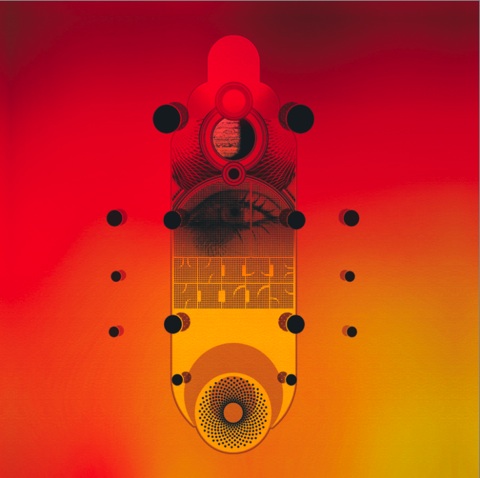White Hills’ previous album, the 2007 Rocket release Heads On Fire, was one of the best long-players to emerge from the “new” space rock scene that includes Comets On Fire, Wooden Shjips and Earthless. It was hard and heavy – blistering guitar leads and thick bass riffs, propelled by driving, motorik drums with added Hawkwind FX. With the long-standing patronage of Julian Cope – probably the biggest imaginable badge of approval among the new wave of psych heads – and the backing of one of alternative music’s coolest labels, fans could be forgiven for assuming that the band’s forthcoming, self-titled album would be the big one – the defining White Hills mission statement. What they have instead is a distinct downward change in gear.
White Hills kicks off in unsurprising fashion, as screeching feedback ushers in “Dead.” However, instead of the expected pyrotechnic lead lines, guitarist Dave W lets the backline dominate; bassist Ego Sensation (rock ‘n’ roll names, guys!) provides a solid yet minimal pulse, whilst Oneida drummer Kid Millions (who also played on “Heads On Fire”) splashes around every corner of his kit. W’s growling chant sits low in the mix, which suits the drone-like nature of the track. Whilst not exactly light years away from selected moments in their back catalogue, “Dead”’s oceanic rumble swells rather than explodes. The slower, more subtle pace carries through to “Counting Sevens” where, again, the guitar is limited to some subtle lead noodling over a similarly sludgy bass riff. As it progresses, the wind-tunnel whooshing FX are cranked up and Millions’ jazzy drum breaks are fed through a dub-like filter; the production trickery intensifies over the course of five minutes before segueing brutally into the following track, “Three Quarters.” Finally, the blistering guitar work that characterised the band’s earlier work puts in an appearance; W accompanies his snarled “On and on” and “No one cares” refrains with a jagged three-note riff, then proceeds to tear some searing solos from his strings for the last half of the track’s nine-minute duration. It’s a welcome return to older, wilder ways, but it doesn’t last long.
Thirteen-minute centrepiece “Let The Right One In” is a brooding slow-burner, and probably the track that best sums up the mood of the album as a whole. The howling FX evident in earlier tracks here recall the chilly feel of the film of the same name, and the suspense builds as trebly guitars simmer underneath the skeletal rhythm section. Like Mogwai a decade ago, the band increase the tension until we are sure the only possible conclusion can be an explosion of noise, but it never comes. Instead of a roar, the beast yawns, then goes back to sleep. After this, “We Will Rise” and “Glacial” provide an extended cool-off period, the former acting as a coda of sorts to the previous track; the latter a drumless six minute wall of ominous industrial tones that goes on just a little bit too long for comfort. Finally, “Polvere Di Stelle” gives all three players a final chance to shine, as the bass-driven drone and guitar freak-outs of the album’s first half are distilled into a 12-minute closer.
Where most other bands would celebrate a new label deal by turning everything up to 11, these guys have taken the unusual step of dialling everything down. Instead of churning out another collection of space-rockers peppered with more atmospheric moments, the band have inverted their own “comfort zone” formula, in the process finding some common ground with more avant-garde peers. White Hills appear to be at some kind of crossroads, but what could be mistaken at first for a lack of ideas or inspiration soon reveals itself as a bold step in a new direction.

